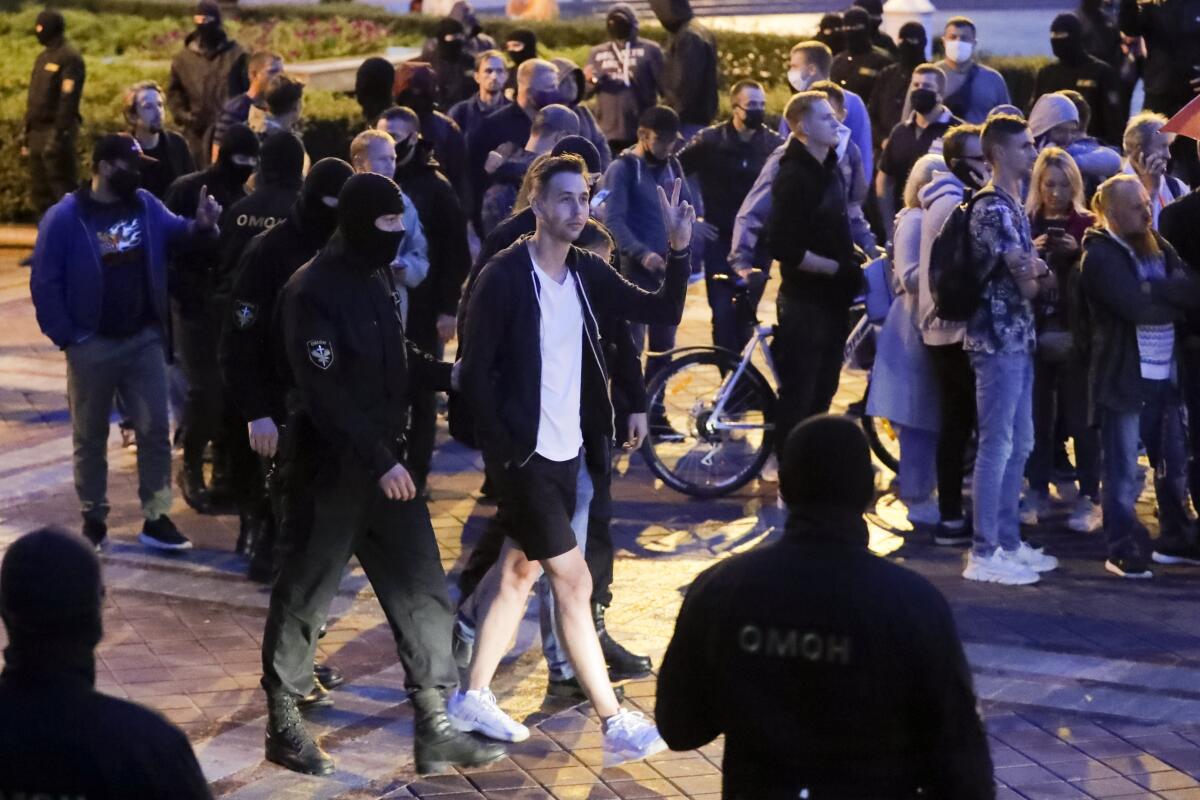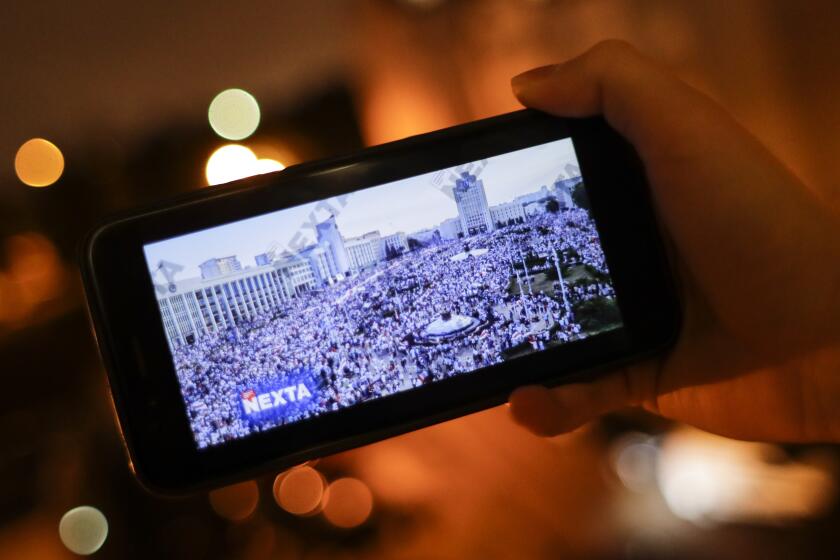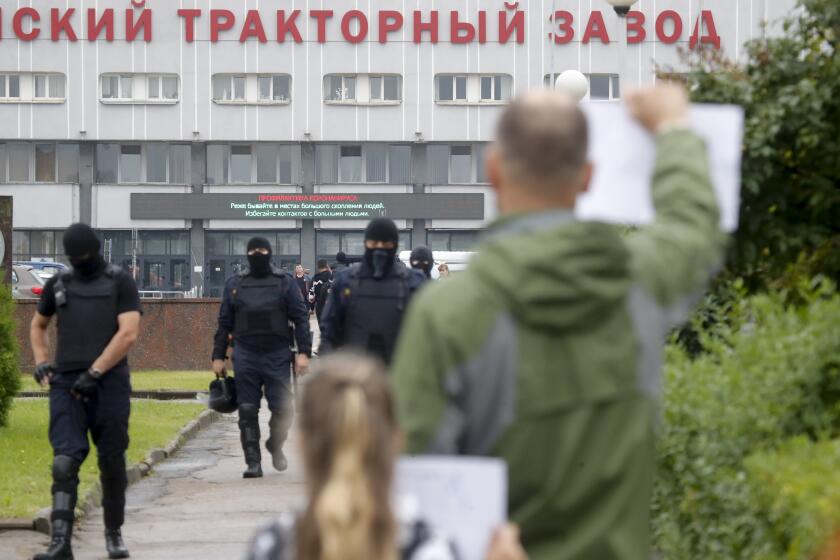Belarus police disperse Minsk protesters, detain dozens

- Share via
MINSK, Belarus — Police in Belarus dispersed protesters who gathered on the capital’s central square Wednesday, detaining dozens in an effort to end weeks of demonstrations challenging the reelection of the country’s authoritarian ruler.
The crackdown in Independence Square on Wednesday came on the 18th straight day of protests pushing for the resignation of President Alexander Lukashenko.
Lukashenko, the autocrat who has ruled the nation of 9.5 million people for 26 years, has dismissed the protesters as Western puppets and refused to engage in dialogue with the opposition contesting his Aug. 9 election to a sixth term.
After a brutal crackdown on demonstrators in the first days of postelection protests, which caused international outrage and helped swell protesters’ numbers, the authorities changed tactics and let daily demonstrations go unhindered for nearly two weeks. The government, meanwhile, has maintained pressure on the opposition with threats and selective jailing of its leaders.
Wednesday’s police action marks the return to force, albeit on a much smaller scale compared with the crackdown in the first days after the disputed election, when nearly 7,000 people were detained, hundreds were injured and at least three protesters were killed.
Shortly after several hundred protesters gathered at Independence Square for an evening protest that has become a daily occurrence, waving their red-and-white flags and chanting, “Go away!” to push for Lukashenko’s resignation, police trucks pulled in.
Officers grabbed demonstrators and dragged them into trucks, tearing away their flags and placards.
Several dozen protesters found refuge in a Catholic church facing the square, and police blocked its doors to keep them inside while they moved to disperse the demonstration.
The Telegram messaging app has become an indispensable tool in coordinating the unprecedented mass demonstrations that have rocked Belarus.
Minsk Bishop Jury Kasabucki condemned the police action as a violation of freedom of conscience and religion and an insult to believers.
“It’s a clear act of intimidation,” said Valiantsin Stefanovich of the Viasna rights center. “The authorities have stopped beatings, but fear and threats remain their main weapon.”
He said that police on Wednesday also detained protesters in another district of Minsk and in the city of Brest on the border with Poland.
As part of a multipronged effort to stifle protest, Svetlana Alexievich, who won the 2015 Nobel Prize in literature, was summoned for questioning earlier Wednesday over her role in an opposition council created to facilitate talks on a transition of power.
Prosecutors have opened a criminal inquiry against the Coordinating Council members, accusing them of undermining national security.
Alexievich contended that she and other council members have done nothing wrong.
“Our goal is to unite society and help overcome a political crisis,” she told reporters. “We must win with our spirit and the strength of our beliefs.”
On Tuesday, two other council members were handed 10-day jail terms for organizing unsanctioned protests, and several others were called for questioning.
The United States and the European Union have criticized the Belarusian vote as neither free nor fair and urged Lukashenko’s government to engage in a dialogue with the opposition.
Ahead of a two-day EU foreign ministers’ meeting starting Thursday, German Foreign Minister Heiko Maas warned that “it’s absolutely unacceptable that members of the Coordinating Council are arrested, interrogated and intimidated.”
“With the daily increasing repression against peaceful protesters, the leadership in Minsk is increasingly sidelining itself,” said Maas, whose country holds the rotating presidency of the 27-nation bloc. “We won’t let serious human rights abuses and breaches of fundamental democratic principles go unanswered.”
Lukashenko, who has ruled the country with an iron fist since 1994, has rejected offers of mediation from the EU. In a show of defiance on Sunday, the 65-year-old leader toted an assault rifle as he arrived at his residence by helicopter while protesters rallied nearby.
European leaders say they do not accept the election results that handed authoritarian President Alexander Lukashenko a sixth term by a landslide.
A wave of strikes at industrial plants across the country has posed an unprecedented challenge to Lukashenko, who had relied on blue-collar workers as his core support base in the past.
In a bid to secure support from Russia, which has a union agreement with Belarus and sees it as a key bulwark against Western expansion, Lukashenko has accused NATO of harboring aggressive plans and beefing up its forces in neighboring Poland and Lithuania.
North Atlantic Treaty Organization Secretary-General Jens Stoltenberg dismissed Lukashenko’s claims as an excuse to suppress protests.
Amid the Western criticism, Russia and China have stood by Lukashenko and warned against foreign interference.
More to Read
Sign up for Essential California
The most important California stories and recommendations in your inbox every morning.
You may occasionally receive promotional content from the Los Angeles Times.















